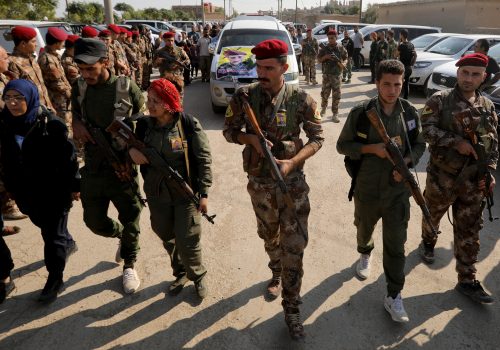Has Moscow really turned against Assad?
Recent Russian press articles have been highly critical of Moscow’s protégé: the Bashar al-Assad regime in Syria. This has led some Western observers to conclude that Moscow may be ready to ditch Assad and see him replaced by someone more amenable to pursuing the internal conflict resolution that will lead to Syrian reconstruction. It is far more likely, though, that these Russian articles criticizing the Assad regime do not presage a Kremlin effort to replace him, but are, instead, a concerted Russian effort to get the Assad regime to change its ways.
Russian President Vladimir Putin has good reason to be annoyed with Assad. Moscow would like to see an internal settlement to the war in which the Assad regime makes peace with enough of its internal opponents so that the fighting dies down drastically and reconstruction can proceed. An article by Ambassador Aleksandr Aksenenok, vice chair of the influential Russian International Affairs Council, recommended that the Assad regime switch its priorities from reconquering all of Syria to pursuing post-war development in the approximately sixty-five percent of the country that it does control.
Such an initiative is vital—from Moscow’s viewpoint—to motivate the West and the Gulf Arab states to provide the funds for Syrian reconstruction, which the Kremlin is neither willing, nor able to provide itself. Moscow is not calling on Assad to actually share power with his opponents, but to cooperate with their efforts to buy them off with the hoped for Western and Gulf Arab reconstruction money. However, Assad and his cronies are, apparently, unwilling to even do this. As Aksenenok noted, “The war produced centers of influence and shadow organizations that are not interested in a transition to peaceful development, although, Syrian society, including businesspeople and some government officials, have developed requirements for political reform… However, this requirement cannot be expressed openly in an atmosphere of total fear and domination by the secret services.”
Russian frustration, then, is not just with Assad, but with these “centers of influence and shadow organizations” that are not interested in “peaceful development”—presumably, because they profit from the continuation of the war. But this does not mean that Russian articles critical of the Assad regime are signaling that Moscow is seeking to replace him.
For one thing, such a move would be resisted not just by Assad and his cronies, but by Iran and its allies, including Lebanese Hezbollah. And, even if Tehran agreed that it was time for Assad to go, in principle, it is not at all clear that they would agree with Russia on who should replace him. Serious differences between Moscow and Tehran over a replacement could result in a power struggle inside Syria, where Iran and its allies have a much larger military presence than Russia does.
Second, replacing Assad, alone, would not materially change the situation, since, the “centers of influence and shadow organizations that are not interested in a transition to peaceful development” would undoubtedly remain. A new Syrian leader might not only be unable to overcome them, but could be unwilling to even try for fear that they could turn on him. In other words, these corrupt Syrian elements, which benefit from the continuation of the war, may not be thriving just because Assad allows them to, but because he cannot afford to alienate them. An Assad replacement, especially, one brought to power by the Russians, could have less control over the aforementioned rogue elements than Assad.
Finally, if Putin decided that he could oust Assad and successfully replace him with someone beholden to Moscow, he would certainly not alert Assad and the rest of the world that he was contemplating this by unnecessarily allowing the Russian press to criticize Assad. As he showed with his sudden moves into Georgia in 2008, Crimea and eastern Ukraine in 2014, and Syria in 2015, Putin likes his surprise attacks to actually be surprises.
These articles in the Russian press criticizing the Assad regime, then, are not a signal that Putin seeks to replace Assad. Instead, they may constitute what the Kremlin might view as a warning; that unless Assad embraces reform to some degree, he may make it too difficult for Putin to continue propping him up successfully.
Mark N. Katz is a professor of government and politics at the George Mason University Schar School of Policy and Government, and a nonresident senior fellow at the Atlantic Council.
Image: Russian President Vladimir Putin, Defence Minister Sergei Shoigu and Syrian President Bashar al-Assad attend a meeting in Damascus, Syria January 7, 2020. Sputnik/Alexei Druzhinin/Kremlin via REUTERS


